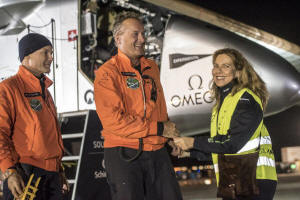|
Solar plane lands in Dayton, Ohio on
latest leg of round-the-world flight
 Send a link to a friend
Send a link to a friend
[May 23, 2016]
By Chris Michaud
(Reuters) - An experimental airplane
powered solely by energy from the sun landed in Ohio on Saturday night
on the latest leg of its historic bid by pilots and developers to fly
around the globe without a drop of fuel.
|

Swiss adventurer Andre Borschberg (C) is welcomed by his wife Yasemin
and alternate pilot Bertrand Piccard after landing Solar Impulse 2 (Si2)
at Dayton International Airport, Ohio, May 21, 2016. Andre Borschberg,
Jean Revillard, Christophe Chammartin/SI2/Handout via Reuters |
|
 The single-seat Solar Impulse 2 aircraft arrived in Dayton shortly
before 10 p.m. local time, some 17 hours after leaving Phoenix
Goodyear Airport, the project team said on its official Twitter
page. The single-seat Solar Impulse 2 aircraft arrived in Dayton shortly
before 10 p.m. local time, some 17 hours after leaving Phoenix
Goodyear Airport, the project team said on its official Twitter
page.
"People told the Wright Brothers & us what we wanted to achieve was
impossible," said Bertrand Piccard after landing. "They were wrong!"
The locale was of special significance to the pilots, as the home
base to aviation pioneers Orville and Wilbur Wright.
Amanda Wright Lane, a descendant of the brothers, neither of whom
ever married, was on hand to welcome the flight.
 With a wingspan exceeding that of a Boeing 747 but an ultra-light
carbon-fiber skin and overall weight of a car, the Solar Impulse
cruises at speeds ranging from only 34 to 62 miles per hour (55 to
100 kph).
The four engines of the propeller-driven aircraft are powered
exclusively by energy collected from more than 17,000 solar cells
built into its wings. Excess energy is stored in four batteries
during daylight hours to keep the plane flying after dark.
The plane can climb to 28,000 feet (8,500 meters), but generally
flies at lower altitudes at night to conserve energy.
Piccard and Andre Borschberg have been taking turns piloting the
plane on each leg of the journey. Both have trained to stay alert
for long stretches of time by practicing meditation and hypnosis.
[to top of second column] |

Borschberg set a new endurance record for the longest non-stop solo
flight last July during a 118-hour trans-Pacific crossing, over five
days and five nights, from Japan to Hawaii. He also set new duration
and distance records for solar-powered flight. Battery damage
sustained during the crossing kept the aircraft grounded for nine
months.
The Swiss team's ultimate goal is to achieve the first
round-the-world solar-powered flight, part of its campaign to
bolster support for clean-energy technologies.
The team hopes eventually to complete its circumnavigation in Abu
Dhabi, the starting point for the journey in March 2015.
The two men completed an earlier multi-flight crossing of the United
States in a prototype of the solar plane in 2013 as a precursor to
their globe-circling quest.
(Reporting by Chris Michaud and Steve Gorman)
[© 2016 Thomson Reuters. All rights
reserved.]
Copyright 2016 Reuters. All rights reserved. This material may not be published,
broadcast, rewritten or redistributed.
 |